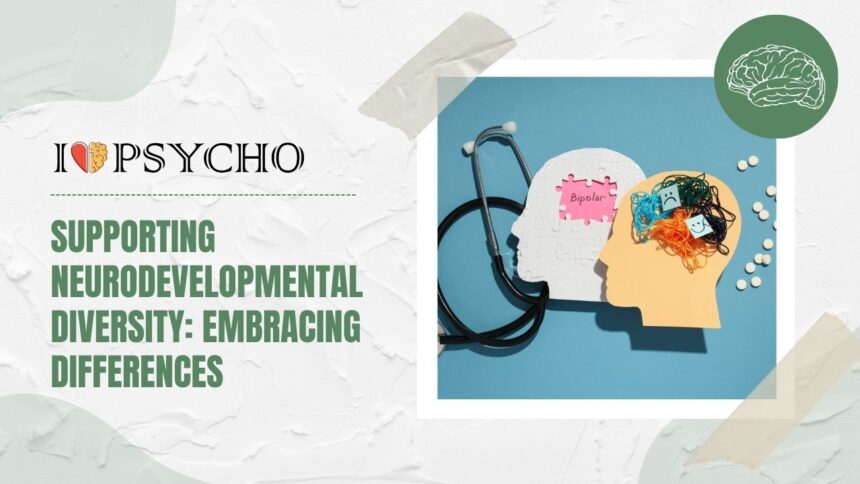Welcome to a world where diversity is not just accepted but celebrated! In this blog post, we delve into the realm of neurodevelopmental differences and explore how embracing these unique variations can lead to a more inclusive and supportive society. From understanding the importance of neurodiversity to discovering ways to advocate for it in education and the workplace, join us on this enlightening journey towards creating a world where everyone’s differences are not only recognized but valued. Let’s embark on this empowering path together!
Understanding Neurodevelopmental Diversity
Neurodevelopmental diversity encompasses a wide range of conditions that affect an individual’s brain development and functioning. This includes autism spectrum disorder, attention-deficit/hyperactivity disorder (ADHD), dyslexia, and other differences that impact how people learn, communicate, and interact with the world around them.
It is crucial to recognize that neurodiversity is not a one-size-fits-all concept; each person’s experience with their condition is unique. By understanding these differences, we can better appreciate the strengths and challenges that individuals with neurodevelopmental diversities bring to society.
Neurodiverse individuals may have exceptional skills in areas such as creativity, problem-solving, pattern recognition, and attention to detail. At the same time, they may face difficulties in social situations or processing sensory information. It’s essential to approach neurodiversity with empathy and an open mind to foster understanding and acceptance within our communities.
The Importance of Embracing Differences
In a world where diversity is the norm, embracing differences becomes essential. Each individual brings their unique perspective and strengths to the table. By valuing these distinctions, we foster creativity and innovation.
Embracing differences allows us to learn from one another, broadening our horizons and challenging our assumptions. It encourages empathy and understanding, creating a more inclusive society where everyone feels accepted for who they are.
When we embrace differences, we break down barriers and build connections that transcend societal norms. We celebrate the richness of human experience in all its forms, recognizing that each person has something valuable to offer.
By embracing differences, we pave the way for a brighter future filled with acceptance and appreciation for the diverse tapestry of humanity. Let’s champion inclusivity and embrace the beauty of our varied perspectives.
Ways to Support Neurodiversity
When it comes to supporting neurodiversity, there are various ways we can create a more inclusive society. One important way is through education and awareness. By educating ourselves and others about different neurodevelopmental differences, we can break down stigmas and misconceptions.
Another crucial aspect is promoting acceptance and understanding. It’s essential to embrace the unique strengths that individuals with neurodivergent traits bring to our communities. Encouraging open communication and empathy helps foster a supportive environment where everyone feels valued.
Providing accommodations and resources is also key in supporting neurodiversity. From offering sensory-friendly spaces to implementing flexible work arrangements, these adjustments can make a significant difference in enabling individuals to thrive.
By taking proactive steps in our daily lives, we can contribute to a more inclusive world where neurodiversity is not just accepted but celebrated for its contributions towards a richer tapestry of human experiences.
Education and Advocacy for Neurodiversity
Education and advocacy for neurodiversity play a crucial role in fostering understanding and support for individuals with diverse neurological profiles. By promoting awareness and acceptance, we can create more inclusive environments that embrace the unique strengths of each individual.
In educational settings, it is essential to provide accommodations and resources that cater to different learning styles. This may involve implementing personalized learning plans, sensory-friendly classrooms, or assistive technologies to empower students with neurodevelopmental differences.
Advocacy efforts aim to break down stigmas and promote equal opportunities for individuals with diverse neurotypes. By advocating for policy changes and raising awareness about neurodiversity, we can work towards creating a society that values diversity in all its forms.
Educators, parents, and communities all have a part to play in advocating for neurodiversity. Together, we can build a more inclusive society where everyone feels accepted and supported in their journey towards success.
Creating Inclusive Environments
Creating inclusive environments is essential for fostering a sense of belonging and acceptance among individuals with neurodevelopmental differences. Inclusive spaces prioritize diversity, equity, and accessibility to ensure that everyone feels valued and respected.
One way to promote inclusivity is by providing accommodations and supports tailored to the needs of each individual. This can include flexible work arrangements, sensory-friendly environments, or assistive technologies to enhance communication and productivity.
Furthermore, promoting open communication and empathy within the community can help break down barriers and foster understanding between individuals with different neurodevelopmental profiles.
By embracing neurodiversity in all its forms, we pave the way for a more accepting and supportive society where every individual has the opportunity to thrive.
Challenges Faced by Individuals with Neurodevelopmental Differences
Individuals with neurodevelopmental differences often face a range of challenges in their daily lives. These difficulties can manifest in various ways, impacting communication skills, social interactions, and sensory processing. The complexity of these challenges can sometimes lead to misunderstandings and misconceptions from others who may not fully understand neurodiversity.
Navigating educational settings and workplaces can be particularly challenging for individuals with neurodevelopmental differences. They may encounter obstacles related to learning styles, executive functioning skills, and adapting to new environments. Additionally, the stigma surrounding neurodiversity can further exacerbate feelings of isolation and exclusion.
Sensory sensitivities are another common challenge faced by individuals with neurodevelopmental differences. Everyday stimuli that most people find manageable can be overwhelming or distressing for those with sensory processing differences. This heightened sensitivity can make it difficult to engage in activities or environments that others may take for granted.
Despite these challenges, it is essential to recognize the strengths and unique perspectives that individuals with neurodevelopmental differences bring to our society. By fostering understanding, empathy, and inclusivity, we can create a more supportive environment where everyone feels valued and respected for who they are.
Strategies for Supporting Neurodiversity in Education and the Workplace
Implementing strategies to support neurodiversity in education and the workplace is essential for creating inclusive environments where everyone can thrive. In educational settings, providing accommodations such as extended time on tests or breaking down complex tasks into smaller steps can help individuals with neurodevelopmental differences excel. Additionally, promoting awareness and understanding among teachers and peers can foster a more accepting atmosphere.
In the workplace, offering flexibility in work schedules or providing quiet spaces for those who may be sensitive to noise can enhance productivity and well-being. Training managers and colleagues on how to effectively communicate with neurodiverse individuals is also crucial for fostering positive relationships and teamwork.
By embracing these strategies, we can create environments that celebrate individual strengths and contributions, leading to greater innovation, creativity, and success for all.
Celebrating Neurodiversity – Success Stories
Neurodiversity brings a beautiful tapestry of unique minds and perspectives to our world. It’s essential to celebrate the successes and achievements of individuals with neurodevelopmental differences. These stories showcase resilience, creativity, and innovation that enrich our society.
One success story could be about an autistic artist whose paintings have captivated audiences worldwide, breaking stereotypes and inspiring others. Another tale might feature a dyslexic entrepreneur who turned his challenges into strengths, building a successful business empire through innovative thinking.
Celebrating neurodiversity isn’t just about highlighting accomplishments; it’s also about recognizing the value of diverse ways of thinking and being in the world. By sharing these success stories, we can inspire others to embrace their uniqueness and pursue their dreams without limits or boundaries.
Conclusion: Creating a More Inclusive Society
Embracing neurodevelopmental diversity is not just an act of kindness; it is a vital step towards creating a more inclusive society. By understanding and supporting individuals with neurodiverse differences, we can build environments where everyone feels valued and respected. Education, advocacy, and inclusive practices are key in fostering acceptance and celebrating the unique strengths that each individual brings to the table.
As we continue to strive for inclusivity, let us remember that diversity is not just about tolerance but about embracing differences wholeheartedly. It is through our collective efforts in education, workplaces, and communities that we can truly create a world where every individual has the opportunity to thrive. Let’s work together to support neurodiversity and pave the way for a brighter, more inclusive future for all.









